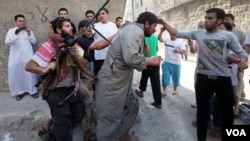Bunyamin Aygun doesn't have to imagine the horror of being an Islamic State hostage. He was one.
For 40 days from late 2013 to the beginning of last year, the Turkish photojournalist was held by what was then known as ISIS.
"In the end, you give into the feeling of death," he told VOA Turkish by Skype from Istanbul. "It was a deep agony you felt, an immense pain .. because you know, they are going to kill you sooner or later. Your chance of survival is one in a hundred or even one in a thousand."
Aygun, an award-winning photographer with the Turkish daily Milliyet, was among the first foreign journalists covering Syria's civil war. Even as other reporters were kidnapped or killed with staggering frequency, he continued to go, trying to shed light on the atrocities unfolding.
His luck ran out while on assignment in northern Syria in late November, 2013, seized by ISIS militants while traveling with a member of the Free Syrian Army.
"Initially, they didn't believe me when I told them I was Muslim. I even recited verses from the Quran. They accused me of being a hypocrite," he recalled. "They told me 'You are serving a non-Muslim government in Turkey. Your newspaper serves the Jews.' It made no difference to them if you are Muslim alone. They take into consideration where you work and where you are from," Aygun said.
That may give insight into the death of military pilot Muath Kaseasbeh, a Sunni Muslim from a prominent Jordanian family.
"If you are a Muslim and if they decide to kill you, they execute you by knife. Those who are Muslims but deemed hypocrites are executed by shooting. If you commit a capital crime, your death is by hanging, regardless of your religion. Depending on the severity of your crime, your lifeless body is kept hanging in the gallows longer."
Aygun regards Kaseasbeh's death by fire as an "isolated incident," an attempt by IS to send a very strong message to the Jordanian government, and through Jordan to the West.
Despite the differences in method, he said the choreographed staging of the murder seemed familiar.
"Your execution video may be rehearsed many times. At first, they call it a rehearsal; the first take. You rehearse the first time, then the second, but they kill you in the third round. If you have noticed, all hostages appear calm in those video footages."
Life in Captivity
For all the horror Aygun felt during his captivity, there were moments of compassion, even humor in the bizarre, as recounted in a memoir of his ordeal. One captor snuck him fresh fruit and tea, but it was a short-lived reprieve; the captor was killed in battle.
More strangely, others thought he might be Israeli. "Because my name is Bunyamin," he said "they asked me if my name had any relationship with Israeli Prime Minister Benjamin Netanyahu.
Bound and blindfolded for much of his time as hostage, Aygun was able to keep track of time only by mandated prayers.
And then it was over.
What Lies Ahead
Aygun was released at the beginning of last year, with members of the Free Syrian Army bringing him out of captivity. Details are unclear, as those involved probably would like them to be; the Turkish government has successfully gained the release of other citizens, reportedly through the payment of ransom and prisoner exchanges, a claim the government denies.
IS hostages from the United States and Britain, which refuse to pay ransom in part because they fear it will encourage more kidnappings, have been killed. On Friday, as the Islamic State claimed an American woman it held was killed in a Jordanian air strike, skeptics thought a more likely scenario was that she died at IS hands.
Aygun wants to see the Islamic State defeated, but he's at a loss to see how it can be done.
"A jihadist in its context means, someone who risks death, wishing to be a martyr," he said. "From my experiences both as a hostage and a reporter who covered the area, they are very well trained fighters. They know how to survive when aerial bombardment intensifies. They also know what to do during a possible ground offensive.”

